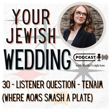Become a Creator today!Start creating today - Share your story with the world!
Start for free
00:00:00
00:00:01

27 - Hebrew/Jewish Names
Clueless about your Hebrew name? What about your fiance/e's? Your ketubah will most likely ask you to provide your Hebrew name - for very important reasons. Don't phone this one in - listen for tips and tricks on the best way to determine your Hebrew name and that of your beloved -whether he or she is Jewish or not.
Transcript
Understanding Jewish Identity and Hebrew Names
00:00:00
Speaker
Even if you don't know your Hebrew name, that doesn't mean you don't have one. But if you don't have one, that doesn't mean that you're not Jewish. It doesn't mean that you're a bad Jew, God forbid, and it doesn't mean you can't get one, okay?
Planning a Jewish or Interfaith Wedding
00:00:16
Speaker
Are you planning a Jewish or interfaith wedding? Are you lost on where to even begin planning the ceremony, let alone finding a rabbi to help you? Well, it doesn't matter whether one of you is Jewish or you're both Jewish. You deserve a guide. So take a deep breath. I promise it will all be okay. Welcome to your Jewish wedding with Rabbi Leanne. Here, I can be everyone's rabbi.
00:00:46
Speaker
Yours too. My guests and I will share everything we know to help make your Jewish or interfaith wedding full of tradition and perfectly yours.
00:01:10
Speaker
Hello, everyone. Welcome back for another episode of the Your Jewish Wedding podcast. I'm so happy to be here with you today. You know, we've been having perpetual construction on my street, not perpetual. Obviously, that's an exaggeration. It's been like a year ongoing. And I think I finally
00:01:31
Speaker
caught the time where the workers are going to lunch. So we shouldn't have any terrible beeping here. I did learn how to take the construction beeps out of the audio. A long time ago, actually, I think it was episode 10, when I interviewed Erin about her Jewish wedding
00:01:50
Speaker
And it was not easy. And to be perfectly honest with you, you know, I've got limited time. I don't want to spend my time taking beeps out of audio. So we're going to do our very best here. That said, oh, before we do that, I know that you want the weather report. I was complaining earlier in the year about how Ohio does not really have springtime.
00:02:15
Speaker
Maybe I set my expectations very low, and that's why I'm so thrilled that for the past several days, I mean, it's been kind of hot in the afternoons, but honestly, we've had really like 78 degree, 80 degree days, a little bit of rain, you know, thank God, and hopefully we have many, many more beautiful spring days ahead of us before summer hits with its humidity and heat, because my hair doesn't like it.
00:02:44
Speaker
I have one of my daughters. It's if it's humid outside, her hair is so beautiful. It's so happy. Not me. That's when if you see me in public ever and I'm wearing like a sleep bonnet, like one of those like snood kind of head covering things. That's why because my hair doesn't need to be out in certain weather. And it's I'm just not even gonna give it a second thought. So
00:03:13
Speaker
Anyhow, I hope you all are doing well.
The Changing Wedding Season
00:03:16
Speaker
We are kicking into wedding season. I have to tell you, this year, my secondary wedding season, which is autumn, is like much heavier in weddings.
00:03:28
Speaker
than the traditional May to June wedding season. So I'm actually feeling a little bit chill as we move into summer and I'm getting ready to spend one of the last summer breaks I have with all four of my kids at home, which makes me a little sad, not very sad, but a little sad in some ways.
00:03:48
Speaker
So I'm feeling, I'm feeling pretty chill and really excited about putting a lot of hours into working on the podcast this summer because that's something that I can kind of do around kids being here. So I wanted to talk about something.
00:04:08
Speaker
That should be, it should be a pretty quick episode.
The Significance of Hebrew Names
00:04:12
Speaker
Okay, I know, I say that every time. But truly, I think it will be. I only want to address this because it comes up with almost every single couple that I work with.
00:04:25
Speaker
And that is the issue of Hebrew names. So let's say that you and your fiance have decided not to hire a rabbi to work with you on your wedding. Okay, there are lots of reasons for that. I personally think I'm a delight to work with. I would love to help you with your wedding, even if you're far, far away. But for whatever reason, if you're not working with a rabbi for your wedding,
00:04:53
Speaker
You don't have somebody to advise you on this. This is something that comes up for almost every single couple. When it comes time to order that katuba, and there is a blank in the form from whoever is doing your katuba, whether it's katuba.com or Becca from Ferevery or anyone of the, oh, Rochelle, any one of the amazing katuba artists that we all know and love from Instagram, they will ask both you and your fiance, what is your Hebrew name?
00:05:24
Speaker
So you might think, okay, Rabbi Leon, but every Jewish person has a Hebrew name, right? I mean, maybe, but also maybe not. Like I said, it's very personal.
00:05:37
Speaker
And thank goodness, because there are so many different people in the world and so many different kinds of Jews, and it takes every single one of us to make the amazing community of Jews in the world. So this can actually turn out to be a bit tricky. Figuring out what to list for your Hebrew name on your ketubah, okay? But before I offer practical advice, like, ah, I know,
00:06:03
Speaker
You just want me to tell you, here's what you write down, but I can't see because I don't know you and, and we're not chatting right now. If you would like to chat about your Katuva with me, send me a message. We'll find a time to meet and we'll, we'll figure something out. Okay. Before I give practical advice though, I want to talk about a little bit about what a Hebrew name is. First of all, what's a Hebrew name used for?
00:06:32
Speaker
If you listen to the episodes on kachibas, you can probably already anticipate.
00:06:39
Speaker
Hebrew name is used for record-keeping. Now you may hear a lot of people talk about the meanings of Hebrew names, a spiritual connection to a Hebrew name. Yes, okay, that is the thing that exists. Naming is a very powerful thing in Jewish culture and in fact in I think almost every culture. However, the primary purpose of a Hebrew name is
00:07:04
Speaker
is record keeping and sort of continuity, right? So your Hebrew name, if you have one, you know, you received it at your bris or your baby naming, and you know that you used it at your bar bat mitzvah, and any time that you were called to the Torah or there was any cause for a document to be written using your Hebrew name, that creates for the Jewish people,
00:07:35
Speaker
evidence that you existed, that you were active in a Jewish community, and also who your parents were.
00:07:46
Speaker
And a lot of times if you are going through lineage, now I know some Jews really like to go through genealogical charts and stuff like that. It can be a little challenging. It's not the same as the Mormons who have sort of like, I think it's easier for Mormons for some reason to sort of trace their heritage back a few hundred years
00:08:11
Speaker
I don't know, first of all, Jews have moved around, maybe a lot more than the Mormons, but also there are several different diasporas and whatever. But there are Jewish genealogists who like to look back through these records. If we have a Hebrew name, we can see the journey of that person from his or her baby naming or bris, barbat mitzvah, God willing wedding, and then here's the thing.
00:08:41
Speaker
onto that person's children. Why? Because when you have a child, your first name becomes part of that child's name because the Hebrew name takes the format of so-and-so, daughter of so-and-so and so-and-so, okay? So your Hebrew name,
00:09:09
Speaker
is going to be Jacob, son of Isaac and Rebecca. So just seeing that chain of names helps us also to trace those records. Also, your parents' names, they're even, I guess, more exacting than a last name. So instead of having one last name, like your Jacob, son of Isaac and Rebecca,
00:09:36
Speaker
And there's also a Jacob son of Isaac and Rachel, right? And we can tell those two different Isaac's and on the Ketubah it's very important that we have your Hebrew name because we want to make sure that the right Isaac is marrying the right Malka. So we want to make sure that we have Isaac son of
00:09:57
Speaker
I'm sorry, we want to make sure that we have Jacob's son of Isaac and Rebecca, not Jacob's son of Isaac and Rachel marrying Malka because that would be incorrect, right? And record keeping is very important to us.
00:10:10
Speaker
as Jewish people who is frequently uprooted, cast about being able to maintain a hold on those roots is something that has always been very important to us. And so that's the primary use of a Hebrew name, and it identifies you to your congregation, to your community, and also in records, okay? And it tells us who your parents were.
00:10:35
Speaker
It also, interestingly, tells us in some traditions, in the tradition we use in our family, that if your parent was a rabbi, that gets added into your Hebrew name. And if one of your parents
00:10:49
Speaker
I think either of your parents was a Kohen, so a member of the traditionally priestly genealogy or a Levi, which is the Aharonic genealogy. Gosh, that does sound a little Mormon, doesn't it? But we do designate that. And in some synagogues, the first slot of blessings over the Torah is reserved for a Kohen. And then the second one is reserved for a Levi. So that is part of someone's Hebrew name as well.
00:11:20
Speaker
So, why do parents give a Hebrew name to their child at all, aside from this record keeping thing? Just really briefly, maybe, and maybe you're listening because you're thinking about
00:11:36
Speaker
a Hebrew name for your own child. Beshah Tovah may it happen in a good time and this is giving you a little information. So there is, you will hear about a baby naming ceremony especially for little girls. The reason it's a baby naming for little girls and it's a bris for little boys is because the bris is the circumcision.
00:11:56
Speaker
And it is accompanied by a baby naming. Obviously, thank God we do not perform circumcision ceremonies on little baby girls. So that is why you will hear the different terms for that. But the reception of that Hebrew name is kind of like the marker that that child is being officially welcomed into the Jewish community. Like we said, it establishes her as part of the community, connecting it to her parents' names.
00:12:23
Speaker
She will use her Hebrew or Jewish name for every religious purpose throughout her life. So we can see her movement from her baby naming to her bat mitzvah to her wedding and on and on God willing.
00:12:38
Speaker
Now, the real thing about Hebrew names, and this might be important to you if you don't have a Hebrew name that your parents gave you, is that it often recalls an ancestor or another figure that we want to remember. So there are different customs with this. This is one of the famously differing customs between Ashkenazic Jews, Jews that lived in the Eastern European or European diaspora.
00:13:05
Speaker
and Sephardic Jews, so Jews who lived more in the Spanish, African, Arab world diaspora, that Ashkenazi Jews, the European Jews, tend to only name their children after people who have died. This is because of a superstition that we don't want the angel of death to confuse the living child with the living old person, right?
00:13:34
Speaker
However, it also becomes a really poignant mechanism of remembering somebody who has passed and ensuring that that person continues to live on after they have passed away. So, however, in Sephardic communities, it's pretty common to name a child after a relative who is living.
00:13:50
Speaker
So, and you know, I can see the reasons for that also, you know, you get the pride and joy of knowing that you have a child named after you and that honor that that brings. So, you know, it's like isn't whatever you want, but either way, naming it just as in many communities, naming your child, giving them a Hebrew name that honors a relative or a famous figure is pretty common. You will also see it like,
00:14:19
Speaker
for famous historical figures sometimes. I'm pretty sure a lot of babies were named Golda after Golda Meir, the Prime Minister of Israel in the 70s. Anyhow, that doesn't mean, however, if you are a Jewish person,
00:14:35
Speaker
It doesn't mean that you automatically got like some mystical Hebrew name when you were born. Your parents had to give you one. Oftentimes I've heard of a grandparent giving the Hebrew name. That can happen if a child's parents are not involved with the synagogue and in fact are not involved with the Jewish life at all. They don't want anything to do with the baby naming or they're not members of a synagogue. They're not planning on taking the baby to Tat Shabbat for grape juice and challah on Friday at 2 p.m. None of that and so
00:15:04
Speaker
But a grandparent maybe feels a deep connection to this custom and feels some urgency perhaps around naming a baby with a Hebrew name. And so the grandparent will register that child's Hebrew name with the synagogue. Many synagogues automatically will then register that name with the American Jewish Archives in Cincinnati.
Researching and Choosing Hebrew Names
00:15:27
Speaker
Even if you don't know your Hebrew name, that doesn't mean you don't have one. But if you don't have one, that doesn't mean that you're not Jewish. It doesn't mean that you're a bad Jew, God forbid, and it doesn't mean you can't get one. Okay. So.
00:15:42
Speaker
So it's possible that you have a Hebrew name that you don't know about. So just if you're Jewish or you have even one Jewish parent, whether it's your mom or your dad, do a little detective work. Ask mom and dad, ask your grandparents, call the synagogue that maybe was near you or your grandparents synagogue and say, hey, do you have any record of me receiving a Hebrew name? The reason that's important is because
00:16:06
Speaker
First of all, we most likely want to honor your parents' intentions for your Hebrew name. So it could be that you ask mom and dad, what's my Hebrew name? And if your name in English that you use every single day is Rachel, they'll say, of course it's Rachel.
00:16:21
Speaker
You know, and then you'll figure it out that way. It could be that was their intention for you all along, that your everyday name would also be your Hebrew name. In fact, that is what my husband and I did for our children. Their English names on their birth certificates are Hebrew names, and that is the Hebrew name that they're called to the Torah by. And I think we did that sort of, we, I say we,
00:16:44
Speaker
naming my kids was very important to me. It was like some sort of Bible times spiritual connection. I felt with our female ancestors and the power that they exerted in their family by giving their children names. There are beautiful stories in the book of Genesis about this. And I had relatively easy pregnancies, but I did not like it. So I said to my husband, I was like, listen, you can have a veto.
00:17:10
Speaker
But I'm going to do this naming thing. So all my kids have, well, some of their names are kind of strange. Unusual, we'll say unusual. And I really wanted their American everyday names to be the same as their Hebrew names because of the possibility that records would be lost. I felt really like a really strong connection to the idea that it's possible that we could write down their Hebrew name somewhere and God forbid something could happen.
00:17:38
Speaker
Things could be lost, God forbid people could be lost, and then the kids wouldn't know their Hebrew names. So their Hebrew names are the names that they are called by every single day and also the names they are called to the Torah by. So it could be that was your parents' intention for you from the beginning. And even if they didn't have a formal pris or baby naming, that is just, maybe it's the reason they gave you a Hebrew name or a family name because they intended for that to also be your Hebrew name. So just to ask, don't assume that they don't know, don't assume that they don't care, please.
00:18:07
Speaker
And the reason I say to do some investigation and to really try to find your Hebrew name is because we do want that continuity. We are concerned about record keeping and we want you to continue using the name that you are known by for ritual purposes, if at all possible.
00:18:29
Speaker
However, sometimes that's not possible. So it could be that your parents say like, yeah, we never gave you a Hebrew name or you can't find it. You know, it exists, but you can't find it. That's fine. According to Jewish law for record keeping purposes, the name that you are known by, like commonly is an acceptable
00:18:57
Speaker
name to use as your Hebrew name because we are mostly talking about this record keeping focus, as I said.
00:19:08
Speaker
if your name is Rachel and your parents are like, oh, that's interesting, you asked, we never gave you a Hebrew name, go ahead and use Rachel on your ketubah, okay? Do not use this opportunity to pick a different fun spiritual name, unless you are going to put in the footwork to like register that name with the American Jewish archives, call the local synagogue and tell them what your Hebrew name is, get a certificate, whatever it is.
00:19:35
Speaker
please don't because, you know, I just want to know who's marrying who and make sure it's the right couple on the right date. And I want that record to be meaningful for God willing future generations. Okay. So we have to know that you are the right person, who you are. We don't want you to say, well, I've really loved the biblical character of Ruth. And so I'm going to use that as my Hebrew name. Like then I'm confused.
00:20:00
Speaker
because it says in the English Rachel that now it's Ruth and I don't know like who this person is and was it a typo and we leave historians guessing and it's a, you know, listen, if you are a genealogist or some kind of historian who works with documents and you would like to come on the podcast and speak about names and record keeping and things like that, please come on the podcast. Email me at your Jewish wedding podcast at gmail.com or come find me on Instagram at your Jewish wedding podcast.
00:20:30
Speaker
And let's talk about it because this is so interesting and I think it's very important. Okay, so if you don't have a Hebrew name at all, okay, and let's say that your English name is Madison.
00:20:46
Speaker
Okay, Madison, so you can, at this point, either choose to go the route of, I'm gonna go by the name that everybody knows me by, and I'm just gonna transliterate Madison into my Hebrew name for the Ketubah. Now, you might feel like this is kind of like a cop-out, but just for a moment, consider that a lot of Jews have quote-unquote Hebrew names or Jewish names that are not in Hebrew.
00:21:16
Speaker
You will see often, or you will hear in synagogue, Hebrew names, people being called to the Torah by names like Hirsch or Bluma.
00:21:28
Speaker
or Yankal or Golda, names like that, or like even names like Sol, or I think even names like maybe sometimes Maria or Mariam, like names that are not Hebrew, names that are maybe Arabic or Yiddish or come from Ladino, which are all languages that Jews have used as they've moved through
00:21:56
Speaker
various diasporas. As the Jews were exiled from the land of Israel,
00:22:03
Speaker
They, I've said it a million times, Jews love to be fashioned. So we name our children names that occur in just the wider culture. And sometimes they're kind of Jewish, but kind of not. And sometimes they are names like Madison, which is why you have a name like Bluma, or Sadie. I've seen Annalise as a Hebrew name, okay?
00:22:28
Speaker
And it's important to keep that non-Hebrew Hebrew name because it does honor somebody, right? It does honor a moment in time or maybe a family member. So it's okay. If you are going to start the tradition in your family, Madison, of just writing down your Hebrew name, Madison,
00:22:47
Speaker
Fine. Then historians will look back on this period and think, look what widespread Jewish practice existed among mainstream American Jews.
00:23:01
Speaker
that they used as their Jewish name, just a very American name, like Madison or like Jaden or like Chloe or whatever it is. And it could be that hundreds of years from now, we will note that as just as remarkable or unremarkable as seeing a Yiddish name as a Jewish name. Okay, so that's fine. You can also, Madison, you can pick a brand new Hebrew name at this time if you want.
00:23:31
Speaker
I know that I said it's important for continuity to have the same name in your katuba as everybody knows you by. However, we will have several other cross checks to make sure that this is the right person and the right date and the right katuba. And if you pick a Hebrew name, so let's say, Madison, you are like, I love the story of the exodus from Egypt. I love the character of Miriam. She speaks to me in several ways. I'm going to take that as my Hebrew name. Then we will see in your katuba, Madison,
00:24:00
Speaker
Oh no, I'm sorry. We will see in your katuba in the Hebrew Miriam, daughter of, and then your parents' names. So let's see your parents' names are Rachel and Saul. So we'll see Rachel and Saul, Miriam, daughter of Rachel and Saul. Well, then we'll see down in the English translation, which is just as important for record keeping that Madison,
00:24:25
Speaker
daughter of Rachel and Saul, or Madison, your last name, and we will be able to understand that that bride is one and the same, that your Jewish name is Miriam, and your English name is Madison, and then this kachuba will serve as maybe the first and only record of that being your Hebrew name, and also important for future generations genealogy, for synagogue records, et cetera.
00:24:48
Speaker
Now you may be asking, okay, but you said that my parents Hebrew names are also attached to my Hebrew name. Yeah. Same process for them. Okay. So talk with them about like, do you remember, you know, do you have a bar mitzvah certificate? What is your Hebrew name on your bar mitzvah certificate? Maybe your dad's name is Mitchell. Okay. What do we think his Hebrew name is? Does he not remember? Maybe you ask your grandmother. So go through that process just because we do want to make sure that we preserve that genealogy. It's very important.
00:25:18
Speaker
Okay, if you don't know one of your parents Hebrew names, or if one of your parents does not have a Hebrew name,
00:25:31
Speaker
That is, like if one of your parents isn't Jewish, okay? There are two ways you can go about it. In a lot of synagogues, they will only use one parent's name. So let's say that Madison, your parent's names are Saul and Janet. Janet's not Jewish and she doesn't have a Hebrew name. So you can just put on, in your katuba, Madison, daughter of Saul.
00:25:57
Speaker
That's fine. That's a totally traditional way to do things. It is the way that many conservative and orthodox rabbis would say that you need to do it. Actually, maybe all? I don't know. My conservative rabbi friends listening to this. What's the rule?
Names in Jewish Contracts and Conversion
00:26:10
Speaker
Or you can just go ahead and transliterate the non-Jewish parent's name into English letters. I do not recommend picking a Hebrew name for a non-Jewish person. And we'll talk about that a little bit more later.
00:26:26
Speaker
just yeah go through that process for your parents names and just make sure we are dotting all our I's and crossing all our T's you will not regret it and you will hope that one day your children God willing will do the same thing for you okay they will bother to ask you about your Hebrew name so
00:26:46
Speaker
Maybe you're thinking, Rabbi Leanne, you said this was going to be a short topic. I know, I know. But the good news is that paradoxically, it can be a lot more complicated to figure out the Hebrew name for a Jewish person than it is to figure out what to put in the blank for a non-Jewish person in an interfaith relationship, okay? So a non-Jewish person who is signing the ketubah as a bride or groom.
00:27:11
Speaker
That's because if you have never been given a Hebrew name and you know for sure that you've never been given a Hebrew name, you can't really get it wrong, okay? There's no, there's nothing, there's no bit of evidence you can possibly overlook, okay? So in other words, for the non-Jewish member of the couple, if you have an interfaith wedding, an interfaith katuba, this katuba is going to be the first time his or her Hebrew name will, you know, enter the chat, so to speak, okay?
00:27:39
Speaker
This will be the first record of this person's name recorded in Hebrew letters, okay? Now, like I said just a couple minutes ago, for a non-Jewish person, I do not recommend choosing a Hebrew name for yourself. Now, of course, this doesn't apply if you are a non-Jewish person and your name is Sarah or Aaron or... I don't know. Why can't I think of any Hebrew names? Asher or...
00:28:12
Speaker
I literally can't. This is so ridiculous. Guys, I promise I know a lot of Hebrew names. So you are a non-Jewish person, but you do have a Hebrew name. It happens all the time. The Bibles are really popular source of names. You can use the Hebrew version of that name in a katuba, but if you are very certainly definitely not Jewish and you're not planning to be Jewish and you never were Jewish and whatever,
00:28:38
Speaker
I would actually recommend transliterating that name of Hebrew origin into Hebrew characters as it sounds in English. Okay. So for example, if your name is Aaron and you're not Jewish and you are not planning on being Jewish ever, and you don't want people to think you're Jewish, then I would not use the Hebrew version of Aaron. I would not use Aharon. I would just transliterate it as Aaron.
00:29:09
Speaker
Okay, in your katuba. Among other things, that is sort of a designation for record keepers and genealogists in the future to indicate that this person is not Jewish. Okay, so if they don't have a Hebrew name, it
00:29:27
Speaker
And especially if we look at their parents names, it can indicate to us that they're not Jewish. So, you know, it's not a for sure thing, but it is a clue. And, you know, whenever I think about this, I just think about, do you guys remember? Well, okay. I'm, I'm 42 as of this taping. I don't know if this custom has faded away, but when I was in like middle school Spanish, it was a thing in class that señora would
00:29:55
Speaker
Go around on the first day of class or like in the first week of class and say, everybody now choose your Spanish name.
00:30:01
Speaker
Do you guys remember this? If you did this, please tell me about it. Like message me on Instagram or comment on one of my Instagram reels or email me at your Jewish wedding podcast at gmail.com and tell me how old you are. And if you guys did this, did you pick a French name? Did you pick a Spanish name in your language classes in like middle school, high school? I like remember, okay. So my name, my English name is Leanne.
00:30:26
Speaker
And I was just like, I don't know, Louisa. And then for like six years, I was Louisa in Spanish class and I didn't like it. And it wasn't me. And it was just like me picking like the first letter. Oh, though, speaking of first letters, let's go back to if you're Jewish and you don't know your Hebrew name, if you would like to retroactively honor,
00:30:48
Speaker
a loved one who has passed away. Like your parents didn't name you after that person, but you're like, I kind of would like to honor that person. Go ahead and do that. And a lot of ways that American families now are doing that is by using just the first letter of that person's name. So let's say like my grandmother is the Harnal Devraha,
00:31:06
Speaker
her name was Helen, so I might use the first letter of her name, but I want to have a Jewish name or a Hebrew name for myself. Maybe I would use Halel, which is the same, you know, that hey letter, that H, okay.
00:31:28
Speaker
You know, that is fine for like, if you're trying to like retroactively Hebrew name yourself according to the custom of Jewish people. But if you're not Jewish and you like, you're not planning to be Jewish, don't, I don't mean for this to sound insensitive. I'm not trying to say don't be a poser. What I'm trying to say is don't think that you have to pretend to be Jewish.
00:31:48
Speaker
for your wedding you know you're not jewish if you have no interest in it if you are not even like identified you are the non-jewish person in this couple and it is you're signing the katuba in order to honor your future husband or wife's tradition then don't feel like you have to like
00:32:07
Speaker
Fake a Jewish name. You don't. Okay. Your name is your name. It's the name you're known by. It's a good name. You know, people like you, you are kind, you are smart, you're popular, you know, use your name. So that, and that is absolutely fine. I want to be crystal clear about that. Okay. You can sign a Jewish contract, even if you don't have a stereotypically Jewish name.
00:32:32
Speaker
And thanks to the marvel that is modern Hebrew, you know, modern Hebrew is a revitalization of a language that was dead for thousands of years. Nobody spoke Hebrew in the land of Israel or anywhere on the planet for thousands of years, and it was revived at the dawn of the contemporary state of Israel.
00:32:54
Speaker
at the end of the 19th century. Very cool. And we, you know, in speaking modern Hebrew, communicate with people who have sounds like ch and juh and th in their names. And even though those are not letters in the Hebrew language or in the Hebrew alphabet, we've figured out ways to denote those.
00:33:18
Speaker
Do not worry if your name is Theodore. We can write it in Hebrew letters, okay? It's okay. We will figure it out. Okay. So, you know, one more time for those people who were worried, okay? I know that you want to be authentic. The best way that you can be authentic is to be true to your self. You are who you are. You are not like a Jewish facimeal of your otherwise
00:33:45
Speaker
typical self, we, the most important thing is we need to have zero questions about which two people got married with this katuba. So Theodore, just write Theodore in the katuba. It's fine. Your katuba artist or your rabbi can help you transliterate that. Okay. If, listen, if you don't want to talk to me for any other reason, but to figure out how to transliterate
00:34:09
Speaker
Theodore for your katuba just email me I'll send you the Hebrew letters okay even though your katuba artist is probably more than more than capable I know that these artists are very dedicated to their craft and this is an important part of that okay so I you know I mean it whatever your name is whatever name you are well known by if your name is Christian would transliterate Christian into Hebrew letters that's fine if your name is
00:34:32
Speaker
Voldemort that is fine we'll put it in your katuba but please don't put Voldemort in your katuba as a joke I don't think anybody actually has that name so if your name is Tom Riddle whatever it is you know if your name is Rhiannon if your name is Eleanor
00:34:51
Speaker
whatever it is, if your name is, I was going to say like a typically like Indian name, like Aditya or Rohit or something like that. But interestingly, in Indian names, like they sound very Israeli and I think they're really easy to translate into Hebrew characters. So it's like Aditya actually sounds like a Hebrew name.
00:35:16
Speaker
We have a keyword name Edith and we put yeah on the end of like half our name. So anyway, the point is that whatever language it is, if it's a French name, if your name is Simone or Charlotte or, um, Oh my gosh.
00:35:32
Speaker
Etienne, whatever your name is, we'll put it in the katuba. It's okay. Now, are you guys bored of listening to me? Think of different names, please. I'm sure you wish you were here now, so you could also contribute to this if you find this cringe. Okay, regardless, I think we're through it now. Whether your name is Christian or Jesus or whatever it is, we'll figure it out, okay? So we will just put that into your katuba. Same thing with your parents. Now, if you are,
00:36:01
Speaker
maybe distanced from your parents or like your parents disapprove of this whole Jewish thing, it may not sit well with you to have your parents' names in the kachuba, okay? So if, so Theodore, if your parents
00:36:24
Speaker
you know, just are not really on board with all this Jewish stuff and you don't really talk to them and whatever. And you are like, it just feels kind of weird to put Janet and Stanford's name, Theodore, son of Janet and Stanford, into your katuba. Then another really common and actually a very old way of dealing with this for Jewish people who maybe they were like adopted and they
00:36:51
Speaker
They didn't want to use their adoptive parents' names or their adoptive parents' names, didn't feel right about it, or they weren't exactly sure maybe their mother had died in childbirth, God forbid, or something like that, and we're really sure about her Hebrew name or dad's Hebrew name. It is okay to use your surname in the katuba, okay?
00:37:16
Speaker
So Theodore Constantine, your last name is Constantine. You can just write Theodore Constantine in the Ketubah. You can also make it a little more Jewy by writing Theodore Leveit Constantine or Lamesh Pachat Constantine, which basically translates to
00:37:32
Speaker
Well, levate translates to of the house of, which I refer to as the game of thrones option, you know, Theodore of the house of Constantine. It sounds very like medieval, whatever. Or you can just say from the family Constantine and to indicate that that's a surname and not, for example, your father's name Constantine. Okay. So those are all choices that you can use for the Kachuba. I have had
00:37:55
Speaker
You know wildcard a little bonus on the end of this which is actually turning out to be a short episode. Okay Don't now listen. I Don't often say I told you so but here I am. It's a shortish episode. We're coming in under 45 minutes guys. Okay, so One interesting situation that I have encountered recently is let's say there's a person who she knows her Hebrew name and
00:38:24
Speaker
And she knows her mother's Hebrew name. Dad is estranged and not Jewish. Okay. So we've not seen dad since early childhood. We maybe don't even wouldn't even recognize him on the street if we saw him. Okay. Some situation like that, or maybe God forbid he died young. And there is in the mix a step parent.
00:38:51
Speaker
Okay, so stepmom or stepdad is for all intents and purposes, you know, in your heart, in your life, is your parent, is your role model, and has been with you every step of the way and will be at your wedding and will be walking you down the aisle. And, you know, on your bat mitzvah certificate, it just says your name and the name of your mom.
00:39:18
Speaker
But you feel like it's time, you know, this step mom or step dad is Jewish and has a Hebrew name. And this katuba actually could be your opportunity to attach that step parents name to your own and to, you know, for all intents and purposes, kind of recognize him or her as your official parent.
00:39:44
Speaker
Okay. Is it okay for you to add that parent's name into your Kachuba? I mean, yeah, I don't see a high possibility for confusion in this instance because you would still have one name of your mom's and
00:40:04
Speaker
Honestly, aside from reading Torah, which is really not part of the whole record keeping situation, right? Maybe sometimes, okay, maybe they put it in the synagogue rules that you read Torah on this date or whatever. But really the next time you're officially going to use your full Hebrew name, so your name, daughter of mom and stepdad, is when you die.
00:40:32
Speaker
The next time we're going to see that recorded in any super official capacity is going to be, God forbid, and may it be many days ahead on your gravestone. Okay. So I wouldn't worry about it too much if you really feel strongly moved to add step mom or step dad's name.
00:40:47
Speaker
as one of your parents at this point on your katuba, then go for it. You know what I mean? Your name, yes, if you God willing have children one day, will be attached to your child's name, but your entire name doesn't transfer over to your kid's name, just your...
00:41:04
Speaker
first part of your name. The grandparents names fall off at that point, right? So I wouldn't worry too much about that. Now there's one more thing. Now listen, I bragged about being done too early and now here we are. There's one more thing to consider and that is considerations on conversion. Okay. If you are
00:41:24
Speaker
You got engaged to a Jewish person and oh my goodness, you didn't have a strong attachment to a religion of your own. You didn't think you were a religious person. You didn't grow up religious. Your parents don't care. They didn't raise you that way. And now you're marrying a Jewish person and oh my goodness, isn't Judaism a beautiful culture and religion? And wouldn't it be nice for both adults in your household to have the same faith that they both love and they're excited to make a household based on that.
00:41:51
Speaker
and you're planning on converting and it sounds really great and you get engaged and there's like a whole year before you get married and you're like
00:42:00
Speaker
Of course, I can convert to Judaism in that time. And then, hey, all of a sudden, before you know it, you look down at your calendar again, and your wedding is three months away. I'm not judging anyone, by the way. I am experiencing this. I swear to you. Okay, so my daughter, God willing, will have her bat mitzvah celebration. She has already become a bat mitzvah. That means she has already turned 12 years old, but she will be celebrating it. God willing, this coming October, which is five months from now,
00:42:30
Speaker
I swear to all of you listening, two days ago I was telling people her batmas was in a year. Okay? That time for lies. And it takes a long time to do stuff. Ask me how I know. I'm trying to teach this child her Torah portion. She's musically inclined. She's doing a great job and it is still slow going. Okay? So things in the Jewish world can take a lot of time. One of those things famously that takes a lot of time for most people
00:42:55
Speaker
is converting to Judaism. So now all of a sudden, okay, your wedding is in three months and you have maybe sent an email to a rabbi about conversion and then maybe ghosted her.
00:43:07
Speaker
Yes, that's happened to me. It's okay. People have busy lives, but now it's clear that conversion is not going to happen before you get married. Especially if you're a woman, by the way, and you're planning on giving birth to children, try and convert before you give birth to that child.
00:43:27
Speaker
otherwise then you got to do the conversion thing with the baby too and it's actually kind of cute to do the conversion thing with the baby but it's not I think it's not like the easiest thing like logistically so anyway
00:43:41
Speaker
So if you are planning to convert and like, let's say you were like, Oh, God, I ghosted that rabbi. And now like the wedding's three months away, but I'm not giving up. I'm going to start talking with her about conversion and we're going to start classes and we're going to start having meetings. Okay. And you are on the path and you are not wavering and you're, you got no plans to veer off or anything like that. If you will be choosing a Hebrew name for yourself,
00:44:10
Speaker
In my opinion, if conversion is a sure thing in the future, I recommend, and I have recommended to at least one person to use the Hebrew name that you will choose on the document for something before the actual conversion happens as a mode of declaration of intent to convert to Judaism and to choose that name.
00:44:40
Speaker
And, you know, this is really just, honestly, nobody cares if your name on the katuba is different from the name you choose when you convert. If you convert, that document will also be submitted to the archives and nobody will be confused about your name. However, I think for people who are, you know, really, you know, have Jewish neshamas, they have Jewish souls and they, you know, were, you know, if you believe in destiny, they were destined to convert, they might feel a little bit of,
00:45:10
Speaker
they might feel a little bit unsettled by their Jewish name not appearing on their Jewish wedding contract. And so in that case, if you are on the solid path to conversion, there's no question you're in the middle of classes, it's going to happen. Maybe the mikvah had a construction, something going on. I don't know why you didn't convert before your wedding, but for whatever reason,
00:45:31
Speaker
If you're on, if you're the 100% for sure, you're going to convert God willing, you know, do you know it? You know what we say. This is like the most famous Yiddish proverb. And that is when people make plans.
00:45:49
Speaker
God hears them and laughs. Okay. So, you know, Kenahara, Tututu, Loelena, we, you know, we don't ever want to talk about something like it's a sure thing before it's a sure thing. But I think in this case, I would advise you after meeting you and after, you know, if I'm not your rabbi, consult with your rabbi, you can use that intended name on your kachiba, in my opinion.
00:46:12
Speaker
Okay, now I gotta put this disclaimer. You heard Becca and I give this disclaimer. My opinion, even though I say, during this podcast, I'm your rabbi, okay, that only applies to inside of this podcast, which is not your wedding. Okay, I cannot give rabbinic opinions for people who's, I'm not their rabbi, okay. That is a rabbinic opinion that exists in the world without knowing your specific circumstance or without having met you.
00:46:41
Speaker
I cannot give you personally that advice. I'm just telling you as a disclaimer that that is advice that I have given people that I have met and worked with, okay?
Engaging with the Podcast Community
00:46:51
Speaker
Well, this still has been, and I told you a shorter episode than usual. If you learned something, if you were desperate to figure out this whole name for your katuba issue and now you've spent the last 45 minutes with me here on your Jewish wedding podcast and it's been helpful for you,
00:47:10
Speaker
please take a minute to just jot down. Rabbi Lian helped me figure out what name to write on my katuba, really grateful, you know, many happy returns, whatever it is. Jot that down, do a quick, quick review. Like, whatever platform you're listening to this podcast, just click whatever stars, hopefully like five stars, maybe four stars.
00:47:40
Speaker
You know, and put your little thoughts. I learned something, or Rabbi Leon's weather reports bring steadiness to an otherwise chaotic life. Do you guys get that reference? It's from Clueless. Kind of. Or whatever it is, because, not because I'm like greedy for reviews. We all know I'm not getting paid to make this podcast. We all know that this is just a little passion project of mine. However, I really would,
00:48:07
Speaker
consider it, you know, payment tenfold if I knew that it was benefiting and helping as many people as possible or as many people as need the help. And the way that people find podcasts about the things that they need help with is partly through reviews. So don't think about it as helping me. Think about it as helping another couple or another person who's involved with planning a Jewish wedding
00:48:30
Speaker
helping that person, okay? If you're like, Reverend Leanne, you're a shill for whatever and I don't wanna give you a rating. Don't do it for me.
00:48:40
Speaker
Do it for that other person who maybe needs an answer to this question, okay? So I hope that you learned something in this episode. I learned things researching for this episode, and in preparing for this episode, a lot of the wisdom I've shared here, I have gained just within the last couple of years, which shows and proves that in the Jewish tradition, if you think you know everything, you are wrong, and there is always more learning to do. So until next time.
00:49:09
Speaker
Well everyone, I've had the best time being your rabbi for this episode. I'm so glad you joined me for another little bit of insight into planning your perfect Jewish or interfaith wedding. Until you can smash that glass on your big day, you might as well smash that subscribe button for this podcast. I don't want you to miss a single thing.
00:49:31
Speaker
Remember, you can always find me, Rabbi Lian, on Instagram. All one word for even more tips, tricks, recommendations, and wisdom on Jewish weddings.
00:49:48
Speaker
If you want to work with me on your wedding, you'll find all the info you need at YourOhioRabbi.com. Until next time, remember, you deserve the perfect wedding for you. Don't settle for anything less.











